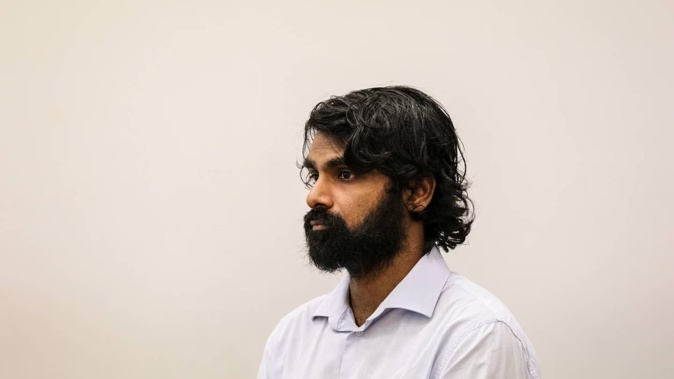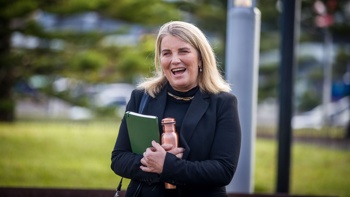
Police have seized an apartment owned by a fake doctor to try to recover the $135,000 he was paid by health authorities in Auckland.
Yuvaraj Krishnan forged reference letters and official documents needed to prove he was qualified as a doctor in order to get a job at Middlemore Hospital, where he saw 81 patients over a six-month period in 2022.
His cover was blown in August by another doctor who knew that Krishnan was never accepted into medical school at the University of Auckland because his academic grades weren’t good enough.
The 31-year-old was quickly sacked by the Counties Manukau District Health Board and then investigated by police, who charged him with 13 offences including perjury, forgery and dishonest use of a document.
The perjury charge was laid because Krishnan had previously sworn false affidavits to the High Court claiming to be a doctor, as well as forged letters of support, in order to be discharged without conviction for an earlier traffic offence.
He successfully argued that a conviction would jeopardise his medical career.
Krishnan pleaded guilty to all charges and was sentenced in the Manukau District Court last month where Judge Nevin Dawson compared him to Walter Mitty - the fictional character eponymous with delusions of grandeur.
“Your offending appears to be driven by a distorted sense of entitlement and a Walter Mitty view of your own life,” Judge Dawson said, adding that Krishnan had caused incalculable harm to the health system and patients.
“They should be able to rely on the health system of New Zealand and not have concerns that they are treated by doctors who are bogus. This is a gross abuse of trust.”
Krishnan was sentenced to three years and seven months in prison but his legal woes are not over yet.
Court documents released to the Weekend Herald show that the High Court has granted restraining orders over Krishnan’s apartment in Manukau, following an application by the police under the Criminal Proceeds Recovery Act.
Krishnan and a friend purchased the property in Putney Way in 2015 for $307,000. It has a July 2021 rateable value of $450,000 and no mortgage.
Under the criminal proceeds law, police can freeze wealth - and eventually ask for the assets to be forfeited - if they can show that someone profited from their criminal offending.
Police apply to a High Court judge, usually without warning so suspected criminals and their allies haven’t time to hide or sell the assets.
Frozen assets are held by the Official Assignee, a government body that administers bankruptcies, until the High Court rules on whether they should be permanently forfeited to the Crown.
The process takes two years, on average, but the most complex cases last much longer.
In the case of Krishnan, the police have calculated he received an “unlawful benefit” of $135,183 from his employment as a qualified medical professional.
He was employed at the Counties Manukau DHB - where officials say it is now much harder to fake their way into a job - on an annual salary of $104,000.
The bogus doctor received $59,395 during his time there, and $75,787 from his previous job at the Auckland DHB as a contact tracer during the Covid-19 pandemic.
While Krishnan was not working as a doctor at the ADHB, the CV he submitted in 2020 for the contact tracing job was fraudulent.
He falsely claimed that he held a Masters in science from Sydney University and had worked as a “health officer” at the Ministry of Business Innovation and Employment (MBIE), where he actually worked in the immigration division.
The false position was not uncovered at the time and Krishnan then moved on to the clinical position at Middlemore Hospital in late 2021.
/cloudfront-ap-southeast-2.images.arcpublishing.com/nzme/DOIN5YMA2PGINFOON6Q3RAHD6A.jpg)
More than $140m sent to New Zealand by Alexander Vinnik has been restrained by the police Asset Recovery Unit. Photo / Supplied
The novel case is the latest example of police testing their powers under the Criminal Proceeds Recovery Act, which came into force in 2009.
In the past, the law has most often been used to seize wealth accumulated by drug dealers and gang members but has pushed into new territory in recent years.
There have been a number of cases involving fraud, piracy, or tax evasion, such as the restraint of $11m of assets belonging to Gisborne farmer John Bracken.
There have also been several high-profile cases involving allegations of wrongdoing in other countries, such as the $140m sent to New Zealand by Russian “computer genius” Alexander Vinnik who has been convicted in France of money laundering.
“While there has been considerable coverage around the restraint and forfeiture of assets resulting from organised criminal group’s illicit activities, our Asset Recovery Unit (ARU) utilises the Act to target the profits of illegal activity in all forms,” said Detective Senior Sergeant Eddie Evans.
“Although the circumstances of this current case is a little unusual, it is evident that the ARU will continue to hold criminals to account and look to strip them of their ill-gotten gains.”
The government recently passed changes to strengthen the Criminal Proceeds Recovery Act, under which police have restrained more than $1 billion worth of assets from suspected criminals since 2009.
Under the previous law, police did not need a criminal conviction to seize assets. They only have to show that someone profited from criminal offending to the lower standard of proof applied in civil cases — “on the balance of probabilities” — rather than surpassing the more difficult “beyond reasonable doubt” threshold for criminal cases.
Under the incoming change to the law, the police would be able to ask the High Court to restrain - and later forfeit - the assets of anyone “associated” with an organised criminal group, if their declared income was insufficient to pay for them.
This is designed to target the leaders of gangs, and organised criminal groups, who the police allege have structured their affairs to “insulate” themselves from involvement, or even knowledge of, profit-driven crimes committed by their members.
Take your Radio, Podcasts and Music with you









